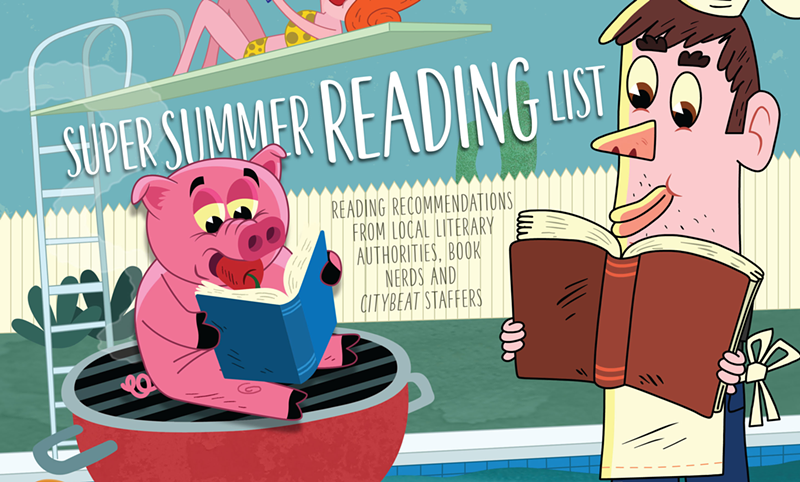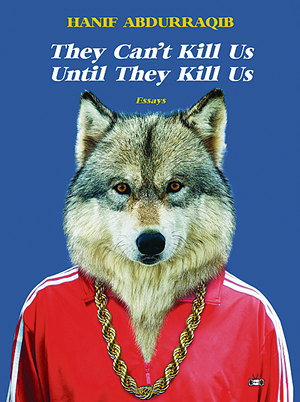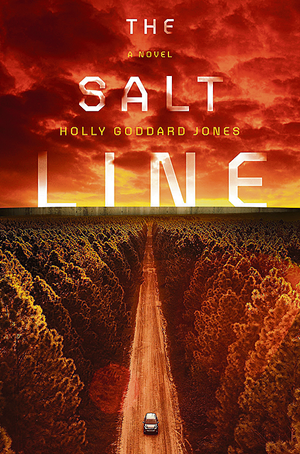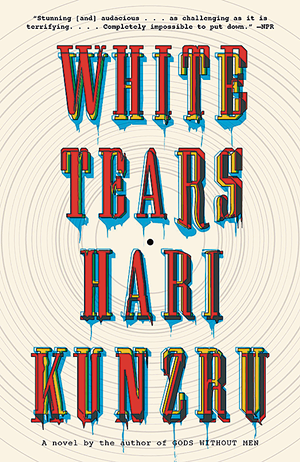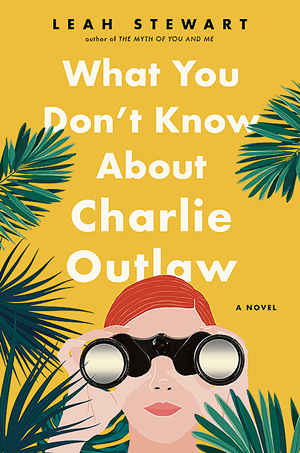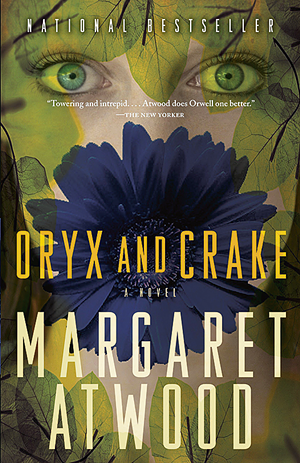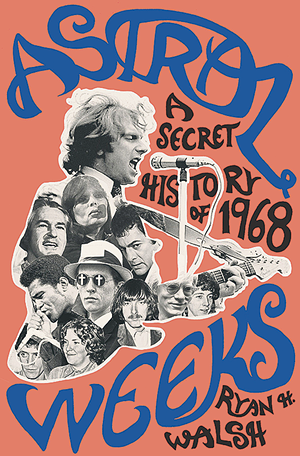Remember in high school when you spent your summers procrastinating, avoiding the soul-sucking drudgery of required summer reading lists in favor of swimming pools and TV? One of the good things about growing up is that the magic of reading returns. As an adult, spending time absorbed in a new book becomes a delicious luxury — a slice of self-care in a busy world.
As such, we have asked a handful of local literary geeks — librarians, novelists, advocates and CityBeat staffers — for their top three “required summer reading” recommendations for adults. The book options range from dystopian adventures and sexy sci-fi to music biographies and true-crime thrillers. There are fluffy reads for poolside lounging and longer, more challenging options for people who want to dig deep. Whether you’re reading alone or with a book club, here are 27 options to pique your interest.
Hillary Copsey
Founder, Make America Read
A firm belief that reading builds compassion, critical thinking and civil discourse led Hillary Copsey to launch Make America Read, a biweekly newsletter that provides book recommendations and discussions to encourage people to read more widely. Copsey is a freelance writer, member of the author selection committee for Books By The Banks and regular book discussion leader at The Mercantile Library.
The Animators, Kayla Rae Whitaker (2016; Fiction)
I’ve recommended this book to everyone since reading it last summer. Funny and cutting, Whitaker’s novel is light enough for a summer read, but smart enough that you’ll linger over the last pages, thinking about ambition and friendship and who gets to tell what stories.
Men We Reaped, Jesmyn Ward (2013; Memoir)
This structurally brilliant memoir isn’t Ward’s most recent, well-known or award-winning book, but I’d argue it’s her best. Telling the stories around the deaths of five young men close to her, including her brother, Ward poignantly and personally considers race, class and masculinity in America.
They Can’t Kill Us Until They Kill Us, Hanif Abdurraqib (2017; Essays)
You know how a song can take you viscerally back into a memory? This essay collection is Abdurraqib letting songs take you into his memories and thoughts. And like songs, these essays — perfectly portioned for plane rides or trips to the pool — get stuck in your head. The book was published by Two-Dollar Radio, a family-run publishing company in Columbus, Ohio, where Abdurraqib grew up.
Leah Stewart
Novelist/University of Cincinnati professor
Stewart is the author of six novels, most recently 2018’s What You Don’t Know About Charlie Outlaw.
The Salt Line, Holly Goddard Jones (2017; Sci-Fi)
I’m always looking for books that are in what I consider the sweet spot, books that have the strengths of both literary and genre fiction — skillful sentences, psychologically complicated characters and compelling plots. This book is a riveting tale of a dystopian future in which the world has been changed by the spread of some truly horrific ticks, and a sensitive, fascinating portrait of the people who have to live there.
Baby, You’re Gonna Be Mine, Kevin Wilson (Aug. 7, 2018; Short Stories)
Kevin Wilson’s first book is one of my favorite story collections ever, both funny and poignant, so I’m really looking forward to this. He brings quirky humor and a touch of the fabulous to the losses and longings of everyday life.
Children of Blood and Bone, Tomi Adeyemi (2018; Fantasy)
I’ve heard great things about this book. As a kid, I loved fantasy, and as an adult I still go looking for that feeling of transport and magic.
Steve Kemple
Librarian, artist and musician
Steve Kemple is the manager of the Price Hill Branch of the Public Library of Cincinnati and Hamilton County and an avid reader.
Mirages of the Mind, Mushtaq Ahmad Yusufi; translated by Matt Reeck and Aftab Ahmad (2014; Fiction)
Last summer I picked up this novel for two reasons: 1) the cover is filled with swirling eyeballs, and 2) it was translated from Urdu, and I had never read anything translated from Urdu. I kept reading because I couldn’t get enough of its protagonist, Basharat, an Indian Muslim who has relocated to Pakistan with his family. In loosely connected anecdotes and digressions, we follow Basharat as he navigates cultural displacement with a series of preposterous schemes, which almost always end badly. In all, he emerges a heroic fool, relentlessly unflappable in the face of his own tragic undoing. Yusufi, who is widely read in his native Pakistan, serves his satire with well-crafted irreverence.
White Tears, Hari Kunzru (2017; Fiction)
To the young Brooklynite music producers Seth and Carter, who are both white, the black music of the early recording era is supremely authentic. In this ambitious novel, the two set out to collect the most obscure 78-RPM Blues records, which they mine for samples to repackage in their own electronic music. When Carter discovers Seth’s recording of a man in a park singing a haunting Blues number that sounds like it drifted in from the past, he doctors it and posts it online, passing it off as a long-lost record by a fictitious singer named Charlie Shaw. The hoax seems harmless, until Seth learns the fake recording — and the singer they invented — are both, somehow, real. The story takes a supernatural turn.
Shanzhai: Deconstruction in Chinese (Untimely Meditations), Byung-Chul Han; translated by Philippa Hurd (2017; Philosophy)
The question posed in White Tears — what’s fake and real, anyway? — is mirrored in the Chinese concept of shanzhai, about which the German-Korean cultural theorist Byung-Chul Han has recently written an interesting book. The term is generally used to describe what most outside of China would call knock-off consumer electronics. However, Han points out that there is much more to shanzhai, which has grown to encompass cultural products such as books, music and movies. Many of the so-called “fakes,” he points out, are better than the originals and in the case of cultural applications of shanzhai, the result is often politically subversive. Although shanzhai is a recent term (dating to the late 1990s), the book traces its antecedents in Chinese art history, where notions of authenticity differ dramatically from Western ones.
Mackenize Manley
CityBeat Copy Editor
Freshly graduated with a double major in Journalism and English, I’m currently basking in the freedom of reading for the heck of it (and for work, too). As a kid, I spent summers reading in the nook of a giant oak behind my home. Now, I generally flip through novels snug in the comfort of my hammock or on my apartment deck. Currently, I’m nearly done with Call Me Your Name — a dreamily-written romance set in Italy. You’ve probs heard of it already, but it’s got my seal of approval, too.
What You Don’t Know About Charlie Outlaw, Leah Stewart (2018; Fiction)
If you’ve yet to take your summer vacay at the beach or need something to read while hanging in your hammock, Leah Stewart’s latest novel is perfect. Plus, she’s a Cincinnati local, which is cool. It’s a page-turner that marries depth with action and cliffhangers. Stewart ties in societal commentary without feeling heavy handed. Outlaw, a popular actor, struggles with his sense of identity, fame and how others perceive him. He’s kidnapped while vacationing on a secluded island to get away, while in L.A., his ex-girlfriend — they both still have feelings for one another — deals with her own diminished fame. Stewart has created an easy, thought-provoking read to escape in.
Theft By Finding: Diaries, David Sedaris (2017; Memoir)
When I was a kid, I would sneak into my sister’s bedroom, pull her fuzzy pink diary from its hiding spot (between the fold of the mattress and box spring) and flip through the pages — simultaneously hoping and feeling terrified that she would find me there. There’s something about a journal of someone’s innermost thoughts spilled onto the page that is fascinating. After I finish Call Me By Your Name, Theft is next on my list. Reading Sedaris before, I expect that the collection will be marked by his trademark observational humor. According to NPR’s review, his diaries “are not especially introspective.” Instead, he acts as a “cultural historian.” This doesn’t come as a surprise having read his work before: Sedaris is an author that looks out before delving inward.
Citizen: An American Lyric, Claudia Rankine (2014; Poetry/Fiction)
Rankine’s Citizen has perhaps never been more relevant than it is now. It wields powerful prose-poetry, often recounting racial aggressions in a society that frequently claims to be “post-race.” Told in interchanging points of view, Rankine, a black woman, forces the reader to encounter race as it stands in America — a very much alive and oppressive social construct — and to dissect his/her/their own behavior. Slight slips of the tongue, tired stereotypes on TV, offensives that could unfurl anywhere... the list goes on. “Micro-agressions” are elevated to larger, systemic violence — like the shootings of unarmed black men by police; depending on what copy you grab, that list will differ. With each shooting, Rankine edits and re-publishes the book to account for their death. Citizen is not a fun read, but it’s essential. It’s often unsettling, uncomfortable and, as a white person, it forced me to confront my own privileges and biases.
Ella Mulford
Popular Library Department Manager – Cincinnati Main Library
Ella Mulford has been working for the Public Library of Cincinnati and Hamilton County for seven years. By some miracle, she still manages to get some reading done with three kids, three cats and a dog running around. She is currently reading Text Me When You Get Home: The Evolution and Triumph of Modern Female Friendship by Kayleen Schaefer.
Dead Witch Walking, Kim Harrison (2004; Fantasy)
This book is the first of The Hollows series. If you loved the Sookie Stackhouse books that True Blood was based on, this series is for you. Witches, vampires, werewolves, pixies, elves and demons, oh my! This series has 15 full-length novels and multiple short story collections, so it could keep you busy all summer. I just finished listening to the entire series again on audio and it was even better the second time around. Bonus: The entire series is set in Cincinnati and Northern Kentucky. It is perfect for a staycation by the pool.
An American Marriage, Tayari Jones (2018; Fiction)
This book was my favorite of 2018 — you can’t put it down. This book will hold your attention from page one. Beautifully written, An American Marriage will give you the entire range of emotions, but its real brilliance is in the storytelling. When characters Celestial and Roy are in the wrong place at the wrong time, Roy gets arrested and goes to prison for a crime he did not commit. Jones makes every character explode off the page as you feel with them and for them. This book tackles hard topics like the prison industrial complex, racism and classism, and Jones expertly maneuvers the plot and characters like a chess master keeping the reader wanting more. Filled with heartbreak, regret, love and hope, this is a book you won’t want to end.
Oryx and Crake, Margaret Atwood (2003; Sci-Fi)
If you are devouring The Handmaid’s Tale on Hulu like I am, you need this book. This is the first book in the MaddAddam Trilogy, which takes us into a post-apocalyptic future. Our main character, “Snowman,” recalls the time before the plague that killed most of humanity to try to understand how he got to his present state. He takes us on a ride that includes: uncontrolled genetic engineering, “miracle” pharmaceuticals, all-seeing corporations and many dark-web-related things. Atwood is a master at creating universes that play at the edges of reality. She makes us think this could be our reality, and she does so in a way that is subtle and terrifying. Read this if you are wondering if things could be worse.
Cedric Rose
Librarian/Collector – The Mercantile Library
I’ve worked in libraries for what, the last couple of decades now? The last 13 of those have been spent on the 11th floor at 414 Walnut Street buying books, talking to readers and meeting authors. But I’m still always a little surprised by how solitary the experience of reading is, yet mentally intimate between a reader and writer so distant in space and time. It’s by no means unique to reading, but the written word relies on so little: this sparse thread of consciousness that, when a reader finds a writer who’s right for them, can have a profound (if quiet) effect.
Manhattan Beach, Jennifer Egan (2017; Fiction)
I really dug Egan’s Pulitzer Prize-winning A Visit from the Goon Squad (2010) for its originality, hipster-sci-fi sensibility and an experimental form that as far as storytelling goes, really paid off by hooking you along and rewarding you with both the miniature stories of which the larger novel is composed, and, when you reached the end, the overall arc. Manhattan Beach is a historical novel; its protagonist is the (fictional) first woman diver at Brooklyn’s Navy Yard, so it’s nothing like Goon Squad. But one of the many pleasures of good fiction is that you fall for both the writing and the mind that made it. Shameless plug: Egan is coming to the Mercantile Library in October, an added incentive for me to read what I’ve looked forward to reading anyway.
Closer You Are: The Story of Robert Pollard and Guided by Voices, Matthew Cutter (2018; Music, Biography)
In 1994, I went to Lollapalooza at Riverbend and as I turned away from the second stage, I was accidentally knocked to the ground by a living wall of sweaty, inebriated Bob Pollard. He didn’t even say anything, but I was impressed by his functional drunkenness and later, performance. In more recent years, I saw a very sober Pollard deliver a stellar free concert on Fountain Square. I love Guided by Voices, but Pollard’s Lo-Fi, up-from-the-basement at age 36, Dayton-born, school-teacher-turned rocker-whose-lyrics-remind-me-of-ancient-poetry mystique also fascinates me. And that last time I saw GBV it seemed as though there was a redemption story there — how art has the power to transcend and maybe even repair flawed characters and broken souls.
How to Change Your Mind: What the New Science of Psychedelics Teaches Us about Consciousness, Dying, Addiction, Depression, and Transcendence, Michael Pollan (2018; Memoir/Philosophy)
There’s been a lot of buzz lately — especially surrounding micro-dosing celebs — about the potentially therapeutic uses of psychedelic drugs. Who better to delve into the subject than The Don of nerdy food writing, Michael Pollan? What’s more, he goes all immersion journalism on the subject, experiencing for himself the effects of LSD, psilocybin and even smoking some terror-inducing toad venom. Despite our advanced technology, the workings of the mind remain a black box to science. Pollan’s trips to inner frontiers shed light on the dark workings of that black box, as well as the untapped potential of these drugs to treat depression, addiction and other modern ailments — even the fear of death.
Steven Rosen
CityBeat Arts & Culture Editor
Steven Rosen is a member of Rock and Read, a music-book reading group.
Astral Weeks: A Secret History of 1968, Ryan H. Walsh (2018; Music, Biography/History)
A recent pick of my book group, this is an inventive, deeply researched account of how the music, politics, drug explorations and countercultural rebellion of the late 1960s/early 1970s combined to make Boston a “secret” (compared to, say, New York or San Francisco) influencer on a changing America during that period. Walsh centers his story on how a cantankerous Van Morrison, while living in Boston, came to write and begin performing his landmark, mystical Folk-Jazz masterpiece, the Astral Weeks album. But there are all sorts of unusual and compelling twists and turns in his narrative about the interconnected nature of all things Bostonian — Timothy Leary, the movie Zabriskie Point, a strange cult leader named Mel Lyman, and much more.
Siren Song: My Life in Music, Seymour Stein with Gareth Murphy (2018; Music, Biography/Autobiography)
This is what I’m reading right now. Stein is an old-fashioned (especially in this digital-music age) “record man,” someone who thrived on his ability to hear hit records and discover music acts capable of becoming stars long before others did. He learned his trade as a Brooklyn teenager interning in Cincinnati with King Records’ Syd Nathan, who treated him like a son, and went on to create the Sire record label (“sire” was another word for king, he figured). Sire believed in Punk Rock and New Wave at a time when bigger, more powerful labels thought acts like the Ramones, Talking Heads, Dead Boys, Richard Hell, Pretenders and many more were too radical for consumer tastes in the age of Classic Rock superstars. The book is a tell-all — Stein is candid about his personal life and his thoughts on other music-business figures.
Flash: The Making of Weegee the Famous, Christopher Bonanos (2018; Biography)
Departing from music, I look forward to this new, comprehensive biography of the singular New York crime/street photographer Arthur Fellig, who used the name “Weegee” because it seemed like he had an occult sensibility (like a Ouija board) to predict where the next body would be found and get there fast with his camera. I’m looking forward to Bonanos separating the myth from the reality of Weegee’s work, and to provide insight into the way he composed memorable street shots like the unforgettable “The Critic.”
Adam Vorobok
Fiction Reference Librarian – Main Library
Adam has worked for the Public Library of Cincinnati and Hamilton County for 10 years. He is an avid reader and needs summer to be longer so he can get through the 100-plus books on his to-read shelves.
Children of Blood and Bone, Tomi Adeyemi (2018; Fantasy)
Read it because summer is a time for adventure. Two young girls hold the secret to returning magic to the land of Orïsha, but they are ruthlessly hunted by the son of the King, who has decided magic must never return. The real magic is Adeyemi’s writing: fun characters, a wild imagination and beautiful world-building that blends in West African mythology.
Songs of a Dead Dreamer and Grimscribe, Thomas Ligotti (1986; Short Stories)
Read it because summer nights are for sitting around a campfire. There are many, many great short stories in this collection, but the one that stands out is “The Last Feast of Harlequin.” A reporter with a penchant for clowns learns about a small town’s harlequin festival. He attends the fête, bringing with him his clown suit. Nothing can go wrong, can it?
Twenty Years After, Alexandre Dumas (1845; Action/Adventure)
Read it because: Summer, for me, was sitting in the backseat reading the largest books I could find while my parents drove through Yellowstone National Park. Most people have heard of The Three Musketeers, but many forget there are a total of five books in the series. Twenty Years After, the second in the series, is by far the best. You have it all: sword fights, international intrigue, the power of friendship, prisoners of the Bastille and one heck of a wonderful villain. Plus, minor spoiler: musketeer versus musketeer!
Maija Zummo
CityBeat Editor in Chief
I read constantly — literally, at my job, but also all the time at home. While I am a champion for print, I love the OverDrive reading app and check out almost a digital book a week from the library (no late fees). Generally, I’m halfway through an Agatha Christie mystery at all times, but have recently been into true crime and history.
The Radium Girls: The Dark Story of America’s Shining Women, Kate Moore (2016; History/Biography)
This incredibly well-researched historical narrative follows the vibrant and tragic true lives of America’s “Radium Girls,” female factory workers in the 1920s who were poisoned by the radium paint they worked with to apply luminous numbers to clocks and dials. The “Undark” paint was a huge fad in home décor and military applications, and these women spent all day lip-pointing brushes dipped in the lethal substance — at the instruction of their employers — ingesting and digesting deadly amounts of glowing poison. When the women started falling ill from radiation sickness — stories detail bone fractures, jaw necrosis, rotting and putrid teeth, shattered hips and femurs — questions about health, safety and the workplace were raised that forever changed our labor laws.
SPQR: A History of Ancient Rome, Mary Beard (2016; History)
Mary Beard, professor of classics at Cambridge University, is one of the world’s foremost classical scholars and this whopping 450-page best-seller offers a fascinating and engaging look at the people, culture, mythology and lost history of ancient Rome. While the language is didactic, Beard writes in a way that is accessible to those with even a casual interest in Rome, covering everything from the founding of the city and the legacy of its emperors to history’s missing stories of women, slaves and lower classes. The book challenges the accepted narrative and makes a compelling case for why these ancient people and their way of life is still relevant today. Not necessarily a poolside read, but you’ll be impressed with yourself when you finish it.
I’ll Be Gone in the Dark: One Woman’s Obsessive Search for the Golden State Killer, Michelle McNamara (2018; True Crime)
With a forward by Gone Girl author Gillian Flynn, this gripping true-crime novel — released in February — took on extra relevance after the arrest of suspected Golden State Killer Joseph James DeAngelo in April of this year. The Golden State Killer, so named by McNamara — the voice behind the website True Crime Dairy — is an extremely violent and sadistic serial killer/rapist who is believed to have murdered 12 people, raped more than 50 and burgled more than 100 houses in California between 1974 and 1986. The cold case became a driving obsession in the life of McNamara, wife of actor Patton Oswalt who herself died tragically of an accidental overdose in 2016. This chilling read is deeply upsetting on a multitude of levels but it’s also equally addictive, in part because of the raw and visceral prose. McNamara was a rare writing talent who could bring horrors to life without sacrificing the humanity of the victims. I’ll Be Gone is as binge-worthy as any Netflix crime doc.

